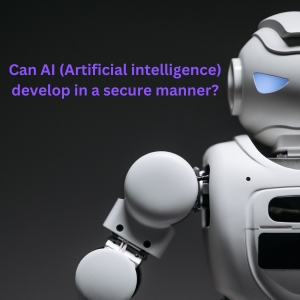Can AI (Artificial intelligence) develop in a secure manner?Posted by Atul on October 10th, 2023  Introduction to AI (Artificial intelligence)Welcome to the world of AI (Artificial intelligence)! As technology continues to advance at a rapid pace, AI has emerged as one of the most exciting and innovative fields. It allows machines to learn, analyze data, and make decisions like humans do, leading to faster and more efficient processes. However, with this growth comes concerns about security. Can AI really develop in a secure manner? In this blog section, we will explore this question and discuss the importance of security in AI development. AI has the potential to greatly impact society and industries in ways we never thought possible. From selfdriving cars to virtual personal assistants, AI is already making our lives easier and more convenient. But as machines become smarter and more complex, so do the concerns regarding their security. So what exactly do we mean by "security" when it comes to AI development? It goes beyond just protecting the technology itself. Security in AI development also involves safeguarding against potential attacks or misuse of the technology. This includes protecting sensitive data and preventing unauthorized access. One of the biggest challenges in ensuring security in AI development is the constant evolution of both technology and threats. As new advancements are made in AI, there will always be those who seek to exploit its vulnerabilities for their own gain. This highlights the need for continuous monitoring and updating of security measures. Understanding AI SecurityOne of the main concerns surrounding AI is the potential for malicious actors to exploit vulnerabilities in these systems. With more tasks being automated, there is a greater risk for cyber attacks to cause significant damage. For example, a hacker could manipulate an AI-powered system to make incorrect decisions or steal sensitive information. Challenges in implementing security measures for AI systems further exacerbate these risks. Unlike traditional software or hardware, which can be designed with specific security features from the outset, AI systems continuously learn and adapt based on large amounts of data. This makes it difficult to anticipate all possible threats and implement robust security measures accordingly. Therefore, it is crucial that developers collaborate with cybersecurity experts throughout the entire process of building an AI system. By involving experts with an understanding of potential threats and countermeasures from the beginning stages of development, potential vulnerabilities can be identified and addressed before they are exploited by malicious actors. Key Challenges in Developing Secure AIOne of the most pressing concerns in the development of AI is its ethical implications. As autonomous systems become more prevalent, it is crucial to ensure that they align with moral and ethical values. This includes avoiding bias in the data used to train AI algorithms, as well as addressing potential biases within the algorithms themselves. Another major concern is data privacy and protection. AI systems require a vast amount of data to learn and make decisions. This often involves collecting personal information from individuals, which can then be at risk of misuse or hacking if not properly protected. Developers must implement robust security measures to ensure that sensitive data is handled ethically and securely. But it's not just external threats that pose a risk to AI systems; there are also internal vulnerabilities that must be addressed. Cyber attacks on AI systems can lead to serious consequences, such as altering the functioning of critical infrastructure or stealing sensitive information. To prevent such attacks, developers must implement proper security protocols and regularly update their systems against emerging threats. Current Strategies for Ensuring AI SecurityFirstly, it is essential to understand that AI security is a constantly evolving challenge. As technology evolves, so do the threats associated with it. That is why it is crucial for developers and organizations to stay updated with the latest security measures and continually improve their strategies. One key strategy for ensuring AI security is to have transparent and explainable algorithms. This means that the decision making process of an AI system should be clear and understandable to humans. Another important strategy for mitigating risks in AI systems is conducting regular risk assessments and audits. These processes involve identifying potential vulnerabilities within an AI system and taking necessary steps to address them before they can be exploited by malicious actors. In addition to these strategies, the use of encryption plays a vital role in securing sensitive data within AI systems. By encrypting data, we can prevent unauthorized access from external sources that could potentially compromise the integrity of an AI system or expose sensitive information. Secure data storage is also crucial in preventing data breaches or leaks which could have severe consequences Potential Risks of Improperly Secured AIOne of the main reasons why AI is vulnerable to attacks is because it relies heavily on data. The algorithms used in AI systems need large amounts of data to learn and make decisions. This data can include sensitive information such as personal data or financial records, making it a prime target for cybercriminals. Moreover, the complexity and interconnectedness of AI systems also make them vulnerable to attacks. These systems often have multiple components and rely on various networks, making them more difficult to secure. Any vulnerability in one component could compromise the entire system, putting sensitive information at risk. The consequences of a cyber attack on an AI system can be severe. In some cases, attackers can manipulate or modify data used by the system, leading to false predictions or decisions. This can have serious consequences in critical areas such as healthcare or transportation where incorrect decisions can put human lives at risk. Mitigating Threats to AI SecurityFirst, let's define what AI is and its benefits. Simply put, AI refers to the simulation of human intelligence processes by machines, especially computer systems. These machines are programmed to learn from data, identify patterns, and make decisions with minimal human intervention. Some of the benefits of AI include increased efficiency and productivity, cost reduction, improved decisionmaking capabilities, and customized user experiences. However, as with any new technology, there are potential threats that come along with it. One of the primary concerns surrounding AI is security. With vast amounts of data being collected and analyzed by these intelligent systems, the risk of data breaches becomes very real. Data breaches occur when sensitive information is accessed or stolen by unauthorized individuals or entities. In the case of AI systems, this can happen when hackers exploit vulnerabilities in the software or when malicious actors deliberately manipulate the data used to train these systems. Regulations and Guidelines for Secure Development of AIThe answer is yes, but it requires careful consideration and implementation of various regulations and guidelines. In this section, we will discuss the importance of incorporating security measures in the development of AI and how government regulations play a crucial role in ensuring its secure development. It is no secret that AI systems have the potential to be vulnerable to risks and threats. These systems are built on vast amounts of data, which means any flaws or biases in the data can result in inaccurate outputs or even malicious attacks. This can have severe consequences, especially in sensitive areas such as healthcare or financial services. Therefore, it is crucial for developers to take security into account from the initial stages of developing an AI system. This includes robust testing protocols, regular updates and patch fixes, adherence to privacy laws and ethical considerations. By incorporating these measures, developers can prevent potential risks and secure their AI system. Check Out:Like it? Share it!More by this author |


